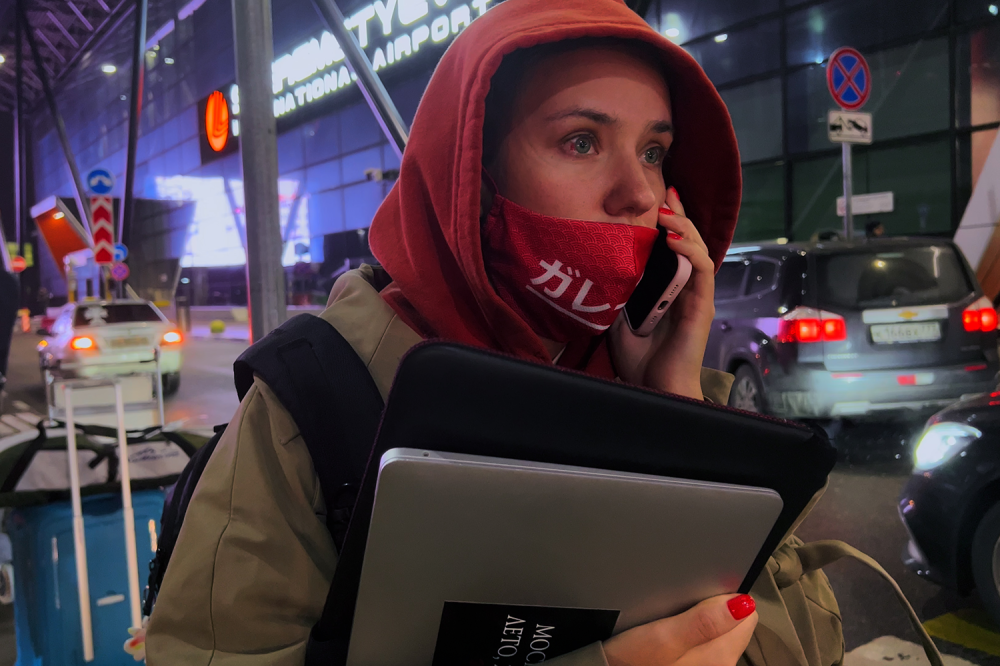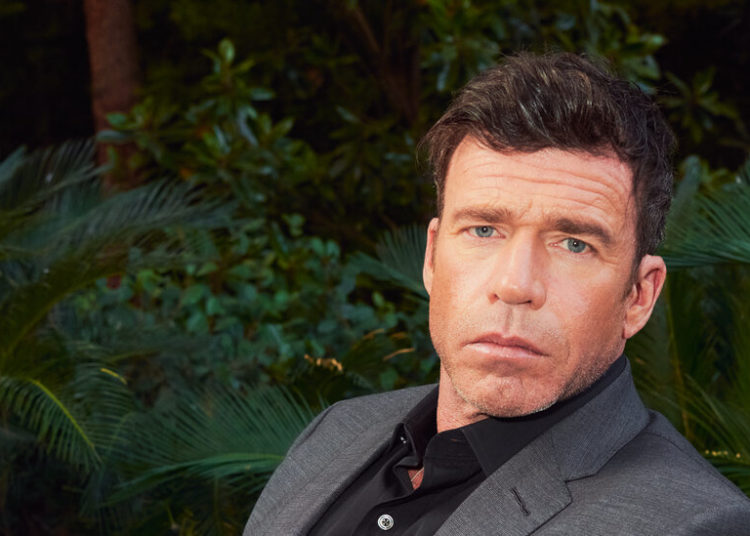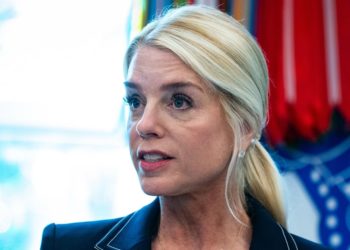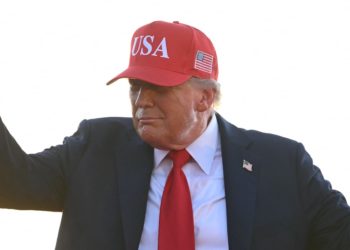December 2021, a Moscow kitchen. It’s close to New Year’s—a time when, according to Soviet lore, miracles were possible—but the conversation among three women is no more cheerful than the winter night outside.
“At 27, I’ve become a very dangerous person for the state,” Irina Dolinina says. She is a journalist with the investigative media outlet that, among other things, ran an exposé on one of Russian President Vladimir Putin’s daughters and the fortune amassed by her once-husband.
“I’ve already buried colleagues,” Dolinina says. “I live my life not feeling safe anywhere. … My colleagues get drugs planted on them. My colleagues get jailed as spies. My colleagues get murdered.”
In the documentary My Undesirable Friends: Part I – Last Air in Moscow, Russian American director Julia Loktev follows a group of independent female journalists whose job is to tell the truth in a place where truth has been banned. In doing so, she offers an extended view of what it’s like to be slowly strangled by an authoritarian state, where every institution is sharpened toward satisfying the grim urges of the man at the top.
For the last 25 years, that man has been Putin. A former KGB lieutenant colonel, he is obsessed with rooting out enemies, domestic and foreign alike. Media has always been at the top of his list: Within a year of his first inauguration in 2000, Putin orchestrated the state takeover of NTV, Russia’s premier independent television channel, and he hasn’t stopped since. Reporters who challenged him were sidelined, satirical shows mocking him pulled off the air, and editorial teams at critical outlets swapped for government-friendly ones.
The assault on media unfolded alongside a steady squeeze on civil society, including nongovernmental organizations, activists, and watchdogs. In 2012, in the wake of anti-Putin protests, the Russian parliament enacted a foreign agent law allowing the Ministry of Justice to designate Russians suspected of being under the influence of other countries as foreign agents.
The term “foreign agent” itself is borrowed from the Stalin era, when authorities were busy hunting so-called enemy agents, interventionists, and provocateurs. As resurrected by Putin’s regime, the designation originally targeted NGOs that received foreign funding and engaged in vaguely defined “political activity.” In the years that followed, it extended to media organizations, then to individuals who dared to work in organizations that criticize the authorities.
The foreign agent law works in tandem with the “undesirable organizations” law passed in 2015, after Putin’s annexation of Crimea and the wave of Western sanctions that followed. The law gave the Prosecutor General’s office and the Ministry of Justice authority to ban foreign-affiliated groups deemed a threat to Russia’s security and was widely seen as a way to cut off U.S. and European funding for civil society. Putin has long been concerned about foreign money fueling dissent. For instance, he has famously accused the West of financing Ukraine’s 2013-2014 Maidan Revolution, which ousted a pro-Russian president.
Over the years, this worldview has been codified into laws that make targets out of dissenters of all stripes. My Undesirable Friends focuses on several of them. It is divided into five chapters of around an hour each; a second installment, Part II – Exile, is currently being edited. The film follows these women designated as foreign agents (many of whom worked for organizations that were deemed undesirable) in the weeks before and after Russia’s full-scale invasion of Ukraine in 2022. It is at once a female odyssey, a historical record, and a hard look at an unraveling society on the edge of the abyss.
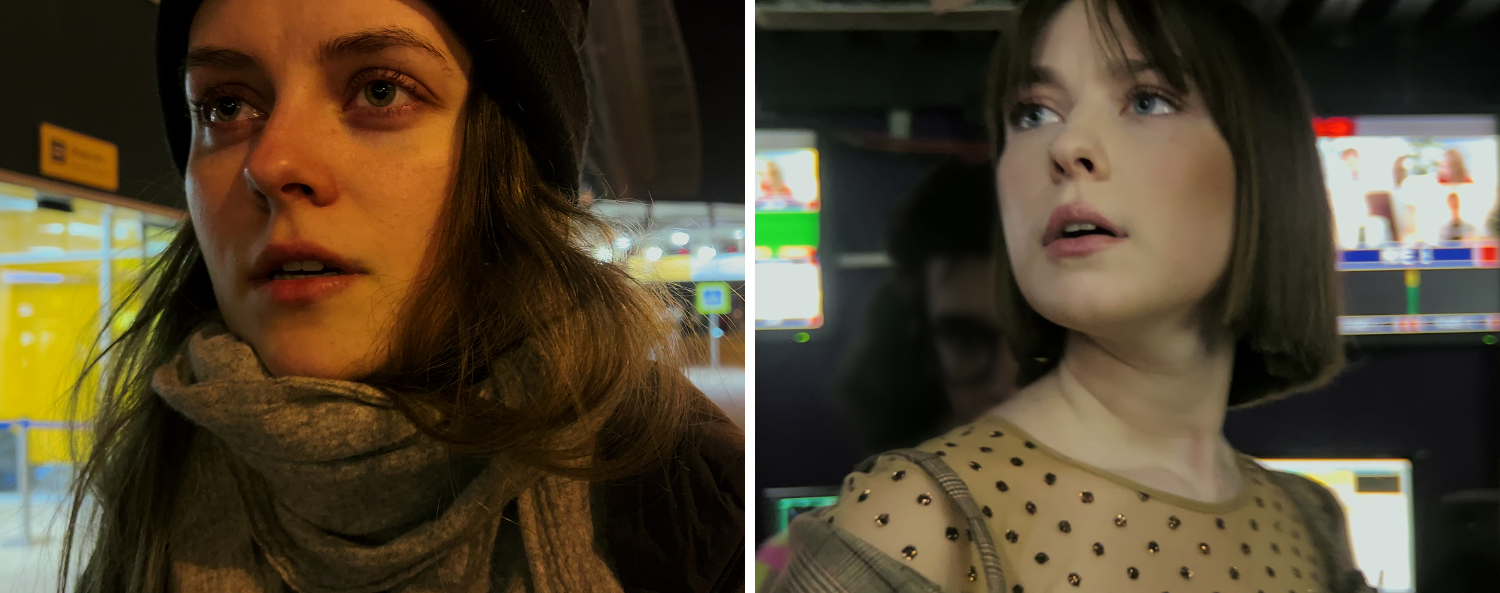
The young women of My Undesirable Friends are all connected to the media outlet Dozhd, rendered as TV Rain in English. Conceived in 2008 at the end of Putin’s second term—when his departure still seemed possible and a progressive successor was expected—Dozhd launched as the “Optimistic Channel,” a television station focused on lifestyle, culture, and entertainment programming, with politics only one part of the mix. Its young staff, witty presentation, and informal, Western-style studios quickly made it a platform for liberal reporters, politicians, and cultural figures.
As Russia grew more authoritarian, Dozhd found itself reporting on abuses of power and airing voices that rejected Putin’s anti-Western, revanchist ideology. The Kremlin noticed. In January 2014, a month before Russia’s seizure of Crimea, Dozhd was accused of insulting veterans after polling viewers on whether Leningrad, which suffered a prolonged and deadly siege during World War II, should have been surrendered to save lives. In a matter of weeks, every cable and satellite provider dropped the station, despite its apologies.
Dozhd shifted its content online. While other outlets lost independence through firings, license revocations, or forced ownership changes, Dozhd remained autonomous and provided a rare counterpoint to state propaganda. The government retaliated with audits, heavy fines for so-called extremism, and advertiser boycotts, pushing the outlet to the brink of bankruptcy. It survived, but its persistence made it more vulnerable to the foreign agent law, which by 2021 had turned into a blunt instrument of repression. On Aug. 20, 2021, less than a month before the parliamentary elections, Dozhd was officially branded as one.
A foreign agent has few rights and many obligations. The most visible of these obligations is to preface every public communication—from news reports to comments on a friend’s Instagram post—with an all-caps disclosure, which the movie’s subjects call “the fuckery”: “THIS NEWS MEDIA/MATERIAL WAS CREATED AND/OR DISSEMINATED BY A FOREIGN MASS MEDIA PERFORMING THE FUNCTIONS OF A FOREIGN AGENT AND/OR A RUSSIAN LEGAL ENTITY PERFORMING THE FUNCTIONS OF A FOREIGN AGENT.” Failure to include this disclosure can result in heavy fines and, in some cases, criminal prosecution.
For an individual journalist, the designation amounts to professional death. Few media outlets risk hiring someone deemed a foreign agent, even in a backroom role, since they would be obliged to disclose the association. A journalist cannot shed the label even if they leave journalism, unless a government body petitions for removal.
While they’re unable to work, those labeled as foreign agents are saddled with bureaucratic obligations so onerous they amount to a full-time job. Once added to the Ministry of Justice’s list, they are required to register a legal entity to comply with government audits. This means annually filing multiple 40-plus-page reports detailing every source of income and matching each to expenses. Misreport by a few cents, and you face criminal prosecution.
This is where Russia finds itself after more than two decades of Putin’s rule—a far cry from the fragile democracy of the 1990s I once knew. Under such conditions, you have to be fearless or a fanatic to persist in journalism.
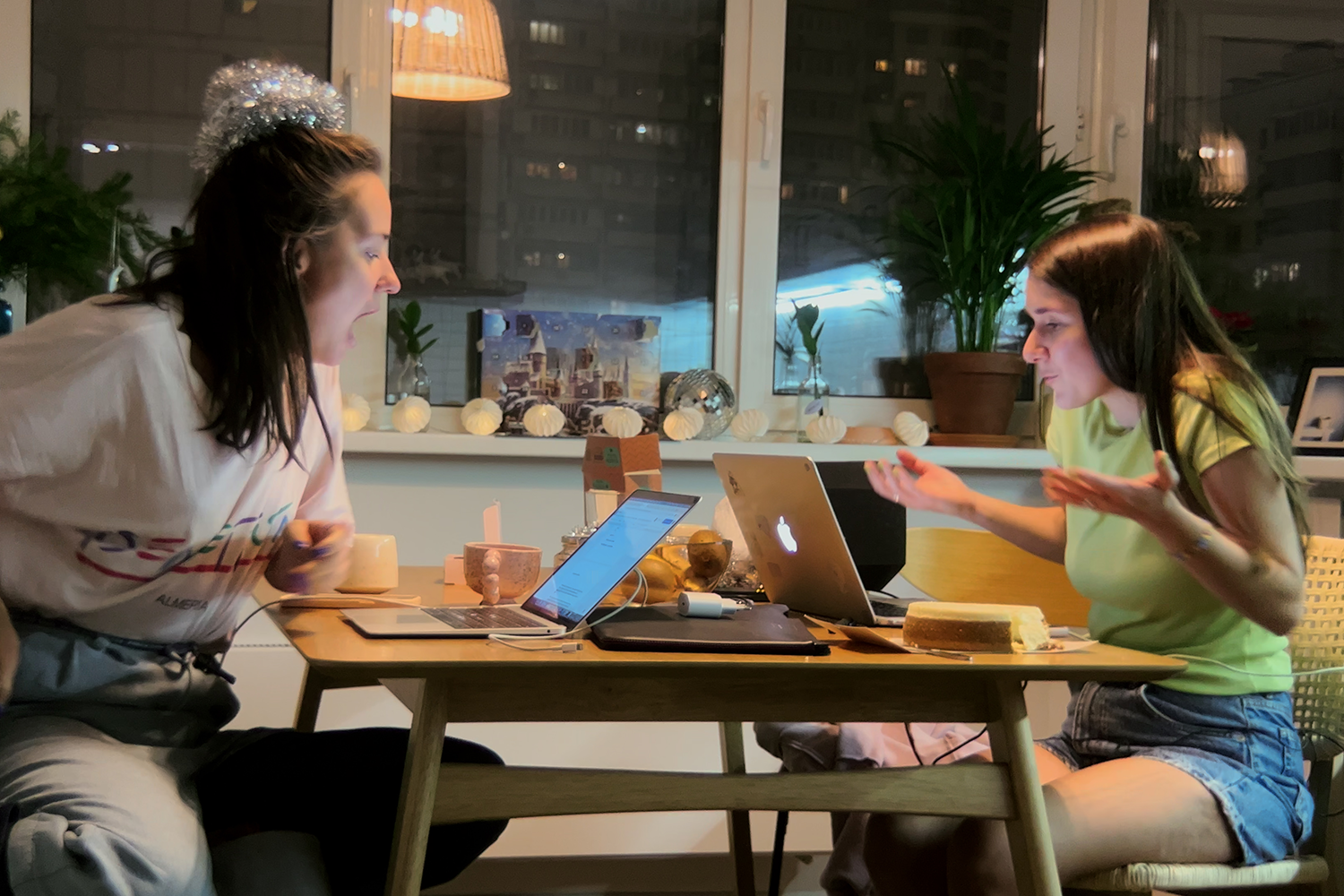
Loktev’s documentary drops us into this world without orientation or explanation. It’s late 2021, with Dozhd still on the air but the impending catastrophe already palpable. The young women of My Undesirable Friends embody precisely the fanaticism and fearlessness that the moment demands: driven, dedicated to the truth, and braver than most men in a country that routinely designates women as the weak gender.
All were at the top of their professions when they were branded foreign agents; all refused to surrender or be defined by it. They confront their new reality with defiance, humor, and a refusal of cynicism that elsewhere might seem naive. In the bleak landscape of Putin’s Russia, that spirit is what makes the film compelling. You want to follow these women—for five hours, or for life.
It’s not difficult to become officially undesirable while working in Russian media. Anna Nemzer, a talk-show host at Dozhd who goes by the nickname Anya, has been branded a foreign agent. Sonya Groysman, a former editor, received the designation after working at a now-banned investigative outlet. The same happened to journalists Irina Dolinina and Alesya Marokhovskaya; Marokhovskaya is also queer, which makes her doubly undesirable and, as of 2023, when Russia’s Supreme Court banned the “international LGBT movement,” officially an “extremist.”
Dozhd reporter Ksenia Mironova, who goes by Ksyusha, on the other hand, could have been the perfect model for Putin’s so-called traditional values—engaged to be married at 23, with clear blue eyes and the soft oval face of a Chekhov heroine—were it not for the fact that, as of filming, her fiancé, fellow journalist Ivan Safronov, has been in a Moscow prison for months on treason charges. With no trial date and no evidence, Ivan was barred from seeing or corresponding with anyone, including Mironova.
One of the film’s most chilling scenes shows Mironova at the post office, packing a box of snacks and warm clothes for Safronov. Both she and the clerk perform their roles with deadened normalcy. This is the face of evil and the image of Russia: The victim doesn’t complain, the state’s proxy is not ashamed; both carry out the roles assigned to them, because what else is there to do?
In the waning days of 2021, the atmosphere in Moscow, where the first three chapters unfold, is summed up by Nemzer: “It’s a wake. But a fun one.” Every day is “a new low,” she says. Every day, “We [wake] up in a new country.”
After being forced out of Moscow’s center, Dozhd found home in a converted factory, with hip studios that look like they could be in New York or London. The staffers make the best of their situation, filming segments like a song called “My Best Friend is a Foreign Agent” or staging a James Bond-esque photoshoot riffing on their agent designation.
But this levity is invariably edged with dread. On one of Dozhd’s studio sets, a prominent lawyer, herself deemed a foreign agent, likens the label to the yellow stars that Jews were required to wear in Nazi Germany. The law is “a weapon aimed to exterminate civil society,” says another guest, human rights defender Svetlana Gannushkina, who at 83 years old is a foreign agent four times over because of her work with different NGOs.
The camera follows its subjects around Moscow as their public and private lives become increasingly intertwined. We enter the women’s kitchens, where they bake birthday cakes for their friends; courtrooms where they futilely challenge their foreign agent labels; cafes where they discuss their podcasts with other undesirables. They talk about Emily in Paris and police vans; their cats bear the names of exiled poets.
There’s camaraderie, refined irony, even adrenaline—but none of them can beat back reality indefinitely. “We’re sitting around this lovely table drinking wine,” Groysman says, “but each of us … is thinking: ‘We’re all fucked.’”
A frequent topic of conversation is whether or when they should all leave Russia. Most know they are not safe but choose to stay and keep working. Some have family they can’t or don’t want to leave; Mironova, for one, fears that fleeing would only confirm the accusations about Safronov’s alleged spying and add years to his sentence. (In 2022, he was sentenced to 22 years in prison.) Others have no visa and no money. And then there’s the Russian attitude of “avos”—the ungrounded belief that things will somehow work out.
When the women gather in the waning hours of 2021, there is hope that the year ahead may be different—without Putin, or at the very least without war. It’s difficult to watch in hindsight, knowing how wrong they are.
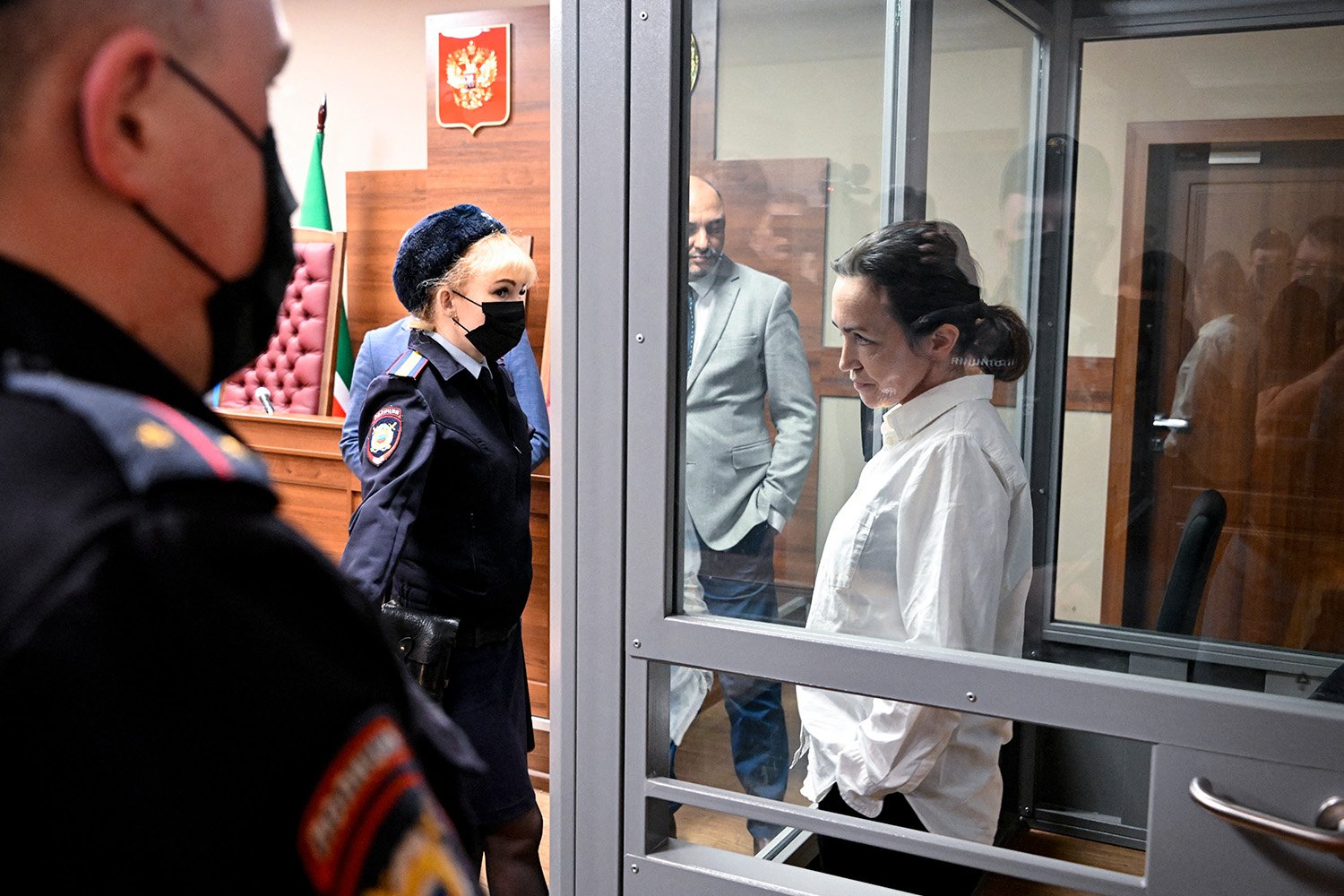
On Feb. 24, 2022, with the full-scale invasion of Ukraine, Putin dispelled these hopes for good. Any aspirations for “the beautiful Russia of the future,” once a slogan of Alexei Navalny’s, were buried under the rubble of bombed maternity wards and kindergartens.
“I don’t have a country anymore,” Nemzer says. I, a Russian American an ocean away that morning, felt exactly the same.
If the film’s first three chapters sometimes feel drawn out, introducing many plotlines at once, the last two chapters slip by in a single breath. Spanning the days and hours leading up to the invasion and the week of its aftermath, the final act gives an arresting inside view of what it was like waking up in a country that overnight turned from a celebrated victor over fascism into a perpetuator of it.
In the war’s early days, Dozhd maintained its independent coverage. While state channels lauded the “special military operation” to free Ukrainians from the “gang of drug addicts and neo-Nazis,” as Putin described Ukraine’s leaders, Dozhd showed footage of shell-shocked civilians hiding from Russian missiles in subway stations. It issued a rare on-air statement condemning the war: “Don’t be silent. Say no to war.”
As the film documents, the road to Dozhd’s closure is rather short. In the first 10 days of the war, the Russian authorities repeatedly lie about not striking civilian targets. They draft laws to ban reporting from sources not approved by the defense ministry. On March 1, Russia’s media regulator blocks Dozhd’s site because of its “extremist reporting.” After a tip about an impending raid by security forces, the staff flee the studio. On March 3, Dozhd—once the Optimistic Channel—suspends operations under pressure from authorities over its fact-based coverage.
As countries close their airspaces to Russian aircraft, those who disagree with Putin are now trapped. “We’re locked up with a madman who has nuclear weapons,” Mironova says. There is desperate mapping out of escape routes and packing of bags; searching for taxis that would shuttle dissenters into Europe, Georgia, Armenia; mothers begging their daughters to leave, to be careful.
Loktev’s subjects now live in Europe and the United States. Some continued their investigative work from abroad, where safety has proved only relative. Both Dolinina and Marokhovskaya, for example, have been harassed and threatened in Prague. Dozhd, too, faced turbulence. After briefly relaunching in Riga, the channel lost its broadcasting license over a controversial segment (the court’s decision has recently been overturned) and had to move again, this time to Amsterdam, where it remains today.
These trials, however, will always be calibrated against the suffering of Ukrainians. The heroes of this film are alive, rebuilding their lives. For hundreds of thousands in Ukraine, there’s nothing left to rebuild.
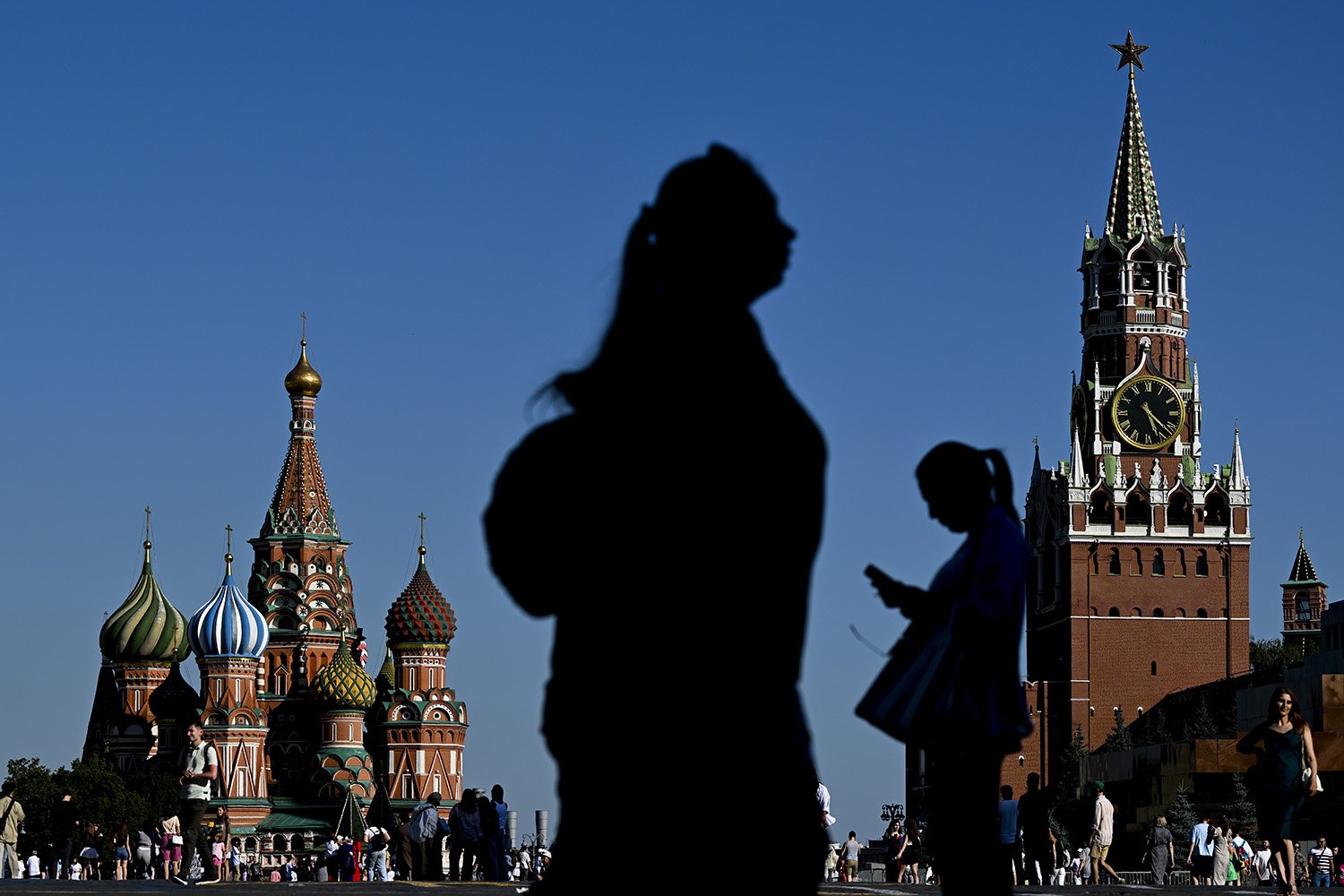
My Undesirable Friends is not an easy watch. Filmed on Loktev’s iPhone, the first three chapters can sometimes feel more like raw archival footage, transcribed to little immediate effect. That’s a deliberate choice, according to the film’s press materials, made to create a record of the world that “no longer exists,” Loktev says in the opening scene. Loktev’s fascination with history is understandable, but unfortunately in the Russian context, this situation is not that unique: A paranoid ruler weaponizes a passive populace against “enemies,” a handful of dissenters notwithstanding, most of whom will be removed without hesitation.
This doesn’t stop the young women in this documentary from agonizing over whether they could have done more to prevent the war. “For 20 years a monster was growing in front of our eyes, whom we all fed with our silence and our passivity,” Marokhovskaya says.
One could say that My Undesirable Friends is a story of failed resistance—a warning to faltering democracies wondering whether one can “turn such a huge country into North Korea,” as Dolinina says. A glance at today’s Russia suffices. The courage of the few was simply not enough to overcome the acquiescence of the many.
The post Putin vs. the Press appeared first on Foreign Policy.
